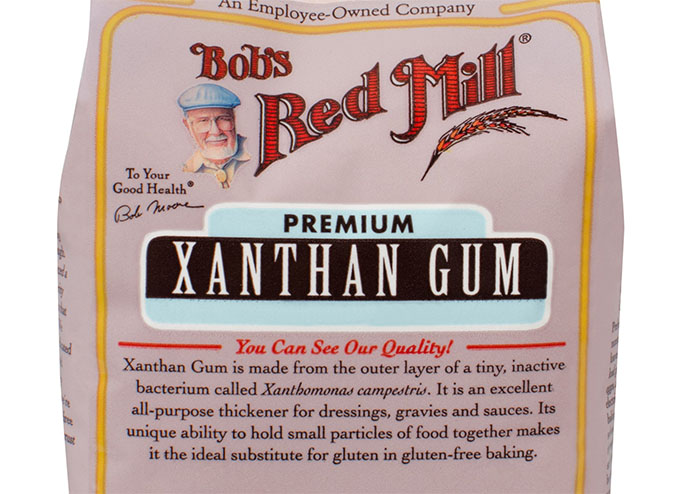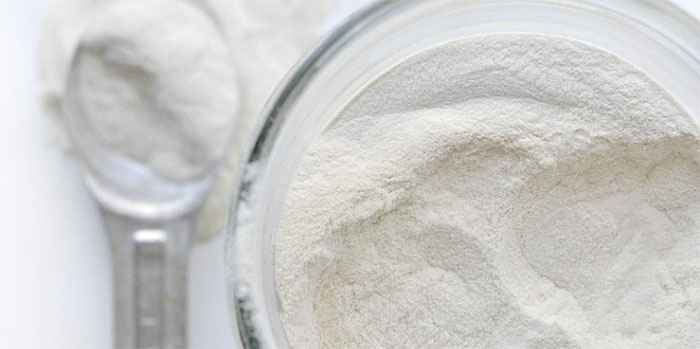Xanthan gum is considered vegan because it is derived from plant sources like corn, wheat, or soy and does not contain any animal products. It can be used in many vegan-friendly products to give them a desirable consistency. Xanthan gum is also gluten-free, making it a popular choice for people with celiac disease.

What Is Xanthan Gum?
Xanthan gum is a food additive that is used to thicken and stabilize foods. It is a polysaccharide produced by the bacterial Xanthomonas campestris, found in soil and plants.
It is a viscous, white to off-white powder that is insoluble in water but soluble in organic solvents. Xanthan gum has a high molecular weight and is negatively charged, making it an effective thickener, emulsifier, and stabilizer. It is used in food, cosmetics, and other industries.
Uses of Xanthan Gum
The food industry is a multi-billion dollar industry that is constantly searching for new ingredients that will improve the texture and stability of food products. Xanthan gum is a recently developed ingredient that has many potential uses in the food industry.
Xanthan Gum in Food
It is a slime-forming polymer used as a food additive and stabilizer. It has thickening, gelling, and binding properties. Xanthan gum is most commonly used in salad dressings, ice creams, and sauces.
Xanthan Gum in Cosmetics
Xanthan gum is used as a thickener, stabilizer, and emulsifier in cosmetics. It can be used to thicken products such as shampoo, conditioner, and face wash.
Xanthan gum can also be used to stabilize products such as lipsticks and foundations. It can help to keep these products from separating and becoming cloudy.
Xanthan Gum in Pharmaceuticals
Xanthan gum has been shown to stabilize emulsions, control the rate of dissolution, and enhance the bioavailability of orally administered drugs. The Food and Drug Administration has approved Xanthan Gum for use in pharmaceuticals as a stabilizer, emulsifier, and thickener.
Xanthan Gum in Agriculture
Xanthan gum can be used as a thickener, an emulsifier, and a stabilizer in many different industries, including agriculture. In agriculture, xanthan gum can be used to improve soil quality, as a fertilizer, and to prevent soil erosion.

How Is Xanthan Gum Produced?
Xanthan gum is produced by the bacterial fermentation of glucose, sucrose, or lactose. The bacteria used in the fermentation process produce a polysaccharide that is rich in glucosamine and mannose. This polysaccharide is then purified and dried to form xanthan gum.
Health Benefits of Xanthan Gum
Xanthan gum is a polysaccharide produced by the Xanthomonas campestris bacterium. It is a viscous, water soluble, and non-toxic substance that is used as a food additive and stabilizer.
Xanthan gum has many health benefits, including:
Promoting Gut Health
Xanthan gum is a prebiotic, which means it promotes the growth of beneficial bacteria in the gut. This can improve gut health and may help to prevent or treat conditions like irritable bowel syndrome (IBS) and constipation.
Reducing Inflammation
Recent studies have shown that xanthan gum may help to reduce inflammation. One study showed that xanthan gum was able to reduce inflammation in rats with arthritis. Another study showed that xanthan gum was able to reduce inflammation in the gut of mice.
Aiding in Weight Loss
Recent studies have shown that xanthan gum may also help with weight loss. One study showed that people who added xanthan gum to their diet lost more weight and body fat than those who did not. Another study showed that xanthan gum was able to reduce appetite and food intake.
Good Source of Fiber, Which Can Help to Regulate Digestion
If you are looking for a good source of fiber, Xanthan gum is a great option. This type of gum is derived from corn and is a natural thickener and stabilizer. Xanthan gum can help to regulate digestion by adding bulk to the stool and stimulating peristalsis. This can be helpful for people who have constipation or irregular bowel movements.

The Risks of Xanthan Gum
Xanthan gum is a popular food additive because it is a natural product and it does not cause allergies. However, there are some risks associated with xanthan gum.
Some people are allergic to xanthan gum, and it can cause gastrointestinal problems in those who are not allergic. Additionally, overconsumption of xanthan gum can result in excessive gas and digestive problems.
Is Xanthan Gum Natural or Artificial?
Xanthan gum is made from a bacterial fermentation process, and is considered a natural ingredient. Some people are concerned that it is an artificial ingredient, but it is actually made from a natural process produced by bacteria.
Is Xanthan Gum considered Halal?
Yes, Xanthan Gum is considered Halal. It is made from a sugar called glucose and a bacteria called Xanthomonas campestris. The bacteria ferments the sugar and produces the gum. There are no animal derived ingredients in Xanthan Gum and it is certified Kosher.
Conclusion
If you are looking for a way to improve the texture of your food, xanthan gum may be the right choice for you. This additive can be used to thicken and stabilize foods, making them more appealing to the palate. However, it is important to weigh the pros and cons of using this ingredient before adding it to your diet.








